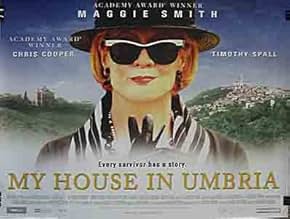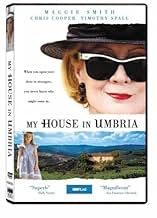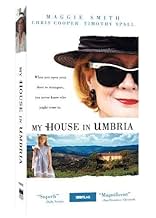IMDb-BEWERTUNG
6,9/10
3756
IHRE BEWERTUNG
Füge eine Handlung in deiner Sprache hinzuAn unlikely group of people find solace and friendship after being thrown together in the wake of a terrorist attack.An unlikely group of people find solace and friendship after being thrown together in the wake of a terrorist attack.An unlikely group of people find solace and friendship after being thrown together in the wake of a terrorist attack.
- 1 Primetime Emmy gewonnen
- 4 Gewinne & 27 Nominierungen insgesamt
Alison Cameron Adam
- General's Daughter
- (as Alison Adam)
Vittoria Colonna
- Young Woman
- (as Vittoria Colonna Di Stigliano)
Handlung
WUSSTEST DU SCHON:
- WissenswertesMrs. Emily Delahunty's (Dame Maggie Smith's) car is an Alfa Romeo 6C-2500, produced between 1947 and 1953. It is a five-seat touring car popular with affluent post-war customers interested in a sporty yet comfortable vehicle.
- Zitate
Mrs. Emily Delahunty: In the garden, delphiniums were in flower. Through scented twilight, the girl in the white dress walked with a step as light as a morning cobweb. That evening she hadn't a care in the world.
Ausgewählte Rezension
Sometimes it is good not to know much about a movie before watching it, so you won't have any prejudices. And it is sometimes even good to have wrong idea about what you're going to see, because you can be pleasantly surprised.
My House in Umbria sounded as it was happening on the beginning of 20th century, either in castle full of aristocrats (like Age of Innocence) or in deserted house with poor artists having no money to leave (Stealing Beauty; Sirens). Room with a View or Under Tuscan Sun came in mind too.
The train in first few minutes was obviously not a century old one. Characters were more likely to fit in Miss Marple story. And that was just a beginning of surprises.
A warm story about so different people that can successfully create a small community (instant family) is so hard to find. Unusual communities are usually shown as unstable group and intense interpersonal relations build the dynamic of group which develops the plot. (Tillsammans, Black Moon, Hair as an example.) But it is developing harmony that we see in House in Umbria, people who learn to lean on each other and help each other in the same time. Almost like an ideal early Christian community. Though religion isn't a topic of the movie, there are more Christian feelings here than in many religious movies. From loving and helping to forgiving. When one of the main characters appears to be the one guilty for all the tragedies that happened to the group, he isn't shown as a villain but rather a seduced man, a poor victim of circumstances.
The only person who is rather odd and doesn't fit is the only one that enters the movie after first five minutes (when we meet all other characters): another surprise - in an American (HBO!) movie the only person we dislike is the only (adult) American character in the movie (played incredible effectively by Chris Cooper as a superb contrast in cast). The interaction between him and the group is the only real conflict we see, and during that time our feelings towards him change. Finally we learn to accept him the way he is (as we should accept all people, says another message of the movie), because he is just that kind of man. He is not evil, he is just different. And, maybe as the only influence he was able to let himself implement, he makes an unexpected choice at the end, realizing that though this community is strange and odious to him, it's not necessary worthless, and it might be wrong forcing someone to replace this warmth and caring love with his scientifically precise but cold, emotionless world.
Something, however, didn't change from the beginning: Maggie Smith is still so Ms Marpleish that I was expecting at least one small murder which she could solve. And all people living in House in Umbria might have been imagined by Agatha Christie, actors (Barker, Spall, Dazzy, Cooper) ideal for Poirot's suspects and even Giannini as inspector could pass well as inspector Japp.
But at the end I didn't mind lack of murder. It was one of those rare TV movies that can be recommended to anyone who prefers emotions and peace instead of action and violence. It is not a soap opera, it is not cheesy; and don't let my words make you understand it is a religious movie: it is humanity in the first place that House in Umbria promotes.
My House in Umbria sounded as it was happening on the beginning of 20th century, either in castle full of aristocrats (like Age of Innocence) or in deserted house with poor artists having no money to leave (Stealing Beauty; Sirens). Room with a View or Under Tuscan Sun came in mind too.
The train in first few minutes was obviously not a century old one. Characters were more likely to fit in Miss Marple story. And that was just a beginning of surprises.
A warm story about so different people that can successfully create a small community (instant family) is so hard to find. Unusual communities are usually shown as unstable group and intense interpersonal relations build the dynamic of group which develops the plot. (Tillsammans, Black Moon, Hair as an example.) But it is developing harmony that we see in House in Umbria, people who learn to lean on each other and help each other in the same time. Almost like an ideal early Christian community. Though religion isn't a topic of the movie, there are more Christian feelings here than in many religious movies. From loving and helping to forgiving. When one of the main characters appears to be the one guilty for all the tragedies that happened to the group, he isn't shown as a villain but rather a seduced man, a poor victim of circumstances.
The only person who is rather odd and doesn't fit is the only one that enters the movie after first five minutes (when we meet all other characters): another surprise - in an American (HBO!) movie the only person we dislike is the only (adult) American character in the movie (played incredible effectively by Chris Cooper as a superb contrast in cast). The interaction between him and the group is the only real conflict we see, and during that time our feelings towards him change. Finally we learn to accept him the way he is (as we should accept all people, says another message of the movie), because he is just that kind of man. He is not evil, he is just different. And, maybe as the only influence he was able to let himself implement, he makes an unexpected choice at the end, realizing that though this community is strange and odious to him, it's not necessary worthless, and it might be wrong forcing someone to replace this warmth and caring love with his scientifically precise but cold, emotionless world.
Something, however, didn't change from the beginning: Maggie Smith is still so Ms Marpleish that I was expecting at least one small murder which she could solve. And all people living in House in Umbria might have been imagined by Agatha Christie, actors (Barker, Spall, Dazzy, Cooper) ideal for Poirot's suspects and even Giannini as inspector could pass well as inspector Japp.
But at the end I didn't mind lack of murder. It was one of those rare TV movies that can be recommended to anyone who prefers emotions and peace instead of action and violence. It is not a soap opera, it is not cheesy; and don't let my words make you understand it is a religious movie: it is humanity in the first place that House in Umbria promotes.
Top-Auswahl
Melde dich zum Bewerten an und greife auf die Watchlist für personalisierte Empfehlungen zu.
Details
- Erscheinungsdatum
- Herkunftsländer
- Offizieller Standort
- Sprachen
- Auch bekannt als
- My House in Umbria
- Drehorte
- Produktionsfirmen
- Weitere beteiligte Unternehmen bei IMDbPro anzeigen
Box Office
- Weltweiter Bruttoertrag
- 1.324.900 $
- Laufzeit1 Stunde 43 Minuten
- Farbe
- Sound-Mix
- Seitenverhältnis
- 1.85 : 1
Zu dieser Seite beitragen
Bearbeitung vorschlagen oder fehlenden Inhalt hinzufügen

Oberste Lücke
By what name was Mein Haus in Umbrien (2003) officially released in Canada in English?
Antwort






























